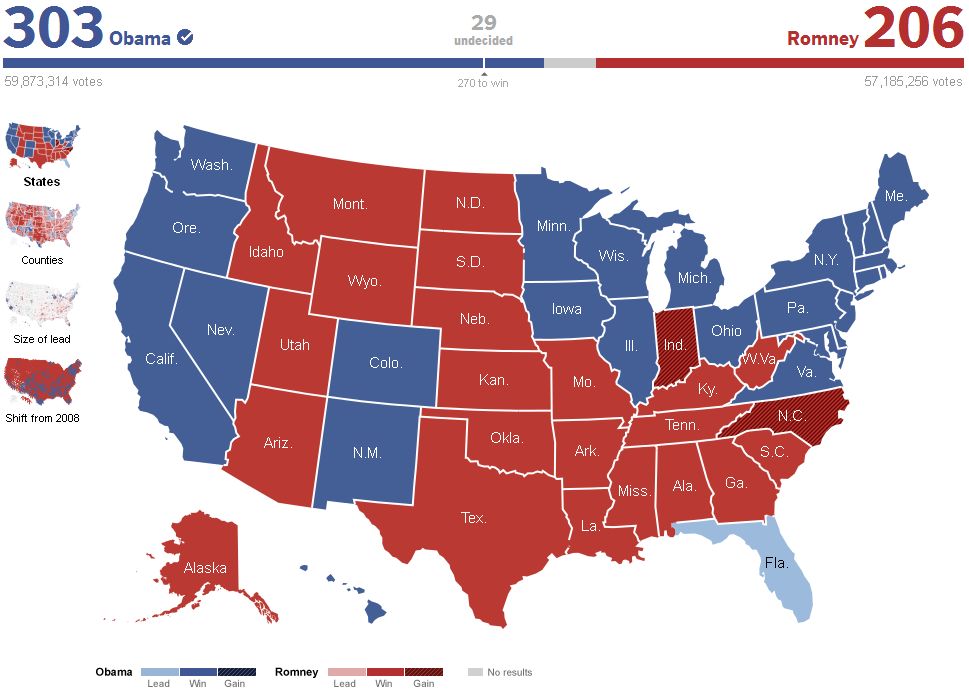The Presidential election was supposed to give someone a moment of triumph. Either voters would reject President Barack Obama and his liberal policies, or they would give him a mandate to finish what he’s started. Instead the President won a narrow victory by ruthlessly attacking Gov. Mitt Romney. This should have been hard, as Romney had proven himself to be a capable, pragmatic leader as well as a morally upright man. So instead Obama turned to attacking Romney’s wealth and his religion, and claiming that Romney hates women, gays, minorities and the poor. As the words of a candidate, they got him re-elected. As the words of a President, they erased all credibility from his speeches about national unity and bipartisanship.
Rather than winning a mandate to continue his policies, Obama became the first sitting president since President Woodrow Wilson to win re-election by a narrower margin than when he was first elected, receiving fewer popular and electoral votes than he did in 2008. One question remains unanswered: “What now?”
After Congress’s failure to agree on a plan to cut our debt, massive spending cuts and tax increases are set to take effect on January 1, 2013. Known as the “fiscal cliff,” it has the potential to put our economy back into recession. The origins of the fiscal cliff lie in Congressional power play during the budget negotiations of 2011, and an array of tax cuts only passed on the condition that they expire at the end of 2012. Congress has failed to prevent this, and they’re running out of time.
Obama has not demonstrated fiscal leadership before, and he’s not likely to learn how now. Expect to hear a lot about how all our problems would be solved if only the Republicans would compromise with him. Like before, Obama and Democratic leaders will immediately reject any conservative proposals as right-wing extremism, while displaying frustration when Republicans don’t accept his ideas. Medicare and Social Security are approaching bankruptcy, and Obama still doesn’t have any suggestions for how to reform them. For now it has been easier to ignore them then risk the political backlash of suggesting reform, but soon they will become a problem he can’t ignore.
The economy remains unstable, and the economic policies Obama has proposed consist largely of “investment” in research and education. Investment means more government spending, and that won’t go through a Republican house. After spending the election telling us that Republican policies are what caused the economic downturn, Obama isn’t likely to turn around and embrace conservative economic policies. This is another area where partisan conflict is likely to sink any chance of advances.
During the President’s next term, the Affordable Care Act, or “Obamacare,” will be fully implemented. Anger over the ACA is what inspired the Republican and Tea Party wave of 2010, and the act is timed so that its most popular elements took effect first. When the less popular provisions are put in place, there will be backlash against the Democrats. In this area in particular, there will be conflict between Federal and State governments. Most Republican governors, including Michigan’s Rick Snyder, have refused to create state Medicare exchanges as required by Obamacare, and if governors refuse to cooperate, the Federal government has no real power to force them. Republicans dominate governorships; we won’t know the exact number until further after the election, but they hold at least 30.
On the foreign policy arena, the death of Americans in Benghazi is not going away. The media has been negligent in reporting this, but what happened is this: on Sept. 11, 2012, terrorists attacked the American embassy in Libya and killed our Ambassador and three other Americans who came to his rescue. Obama was watching from the White House as they died and no troops were deployed to try and save them.. The State Department received an email from intelligence confirming that a terrorist group had taken credit for the attack. President Obama went to bed while the embassy was under attack.
For the next couple of weeks, Obama claimed, before Americans and the UN, that the attack was a spontaneous protest inspired by little-watched youtube video insulting to Islam and Mohammed. This was a willful lie. Democrats can try and wish it away, but Republicans are not going to let it go. The Middle East is becoming more chaotic every day; Iran is continuing its nuclear program, and the leaders overthrown in the Arab Spring protests are being replaced with Islamic extremists who are unlikely to be any better than the dictators they replace. Obama claimed to have ended a “decade of war,” but a whole host of new conflicts are boiling in the Middle East and the rest of the world.
Rather than clarity, the election brought a promise of more partisan conflict in a time when America’s problems are far from fixed. The one thing we can predict is that elections to come will be, if you can imagine it, more vitriolic and harder-fought than this one. It’s a great time for those who watch politics like sports; not so much for those of us who worry about our country’s future.











